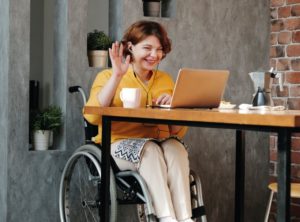Public involvement is central to high-quality, ethical research. So, what happens when a pandemic hits and life is turned upside down? Our colleagues at the NIHR Applied Research CollaborationOxford and Thames Valley set out to find out. This blog was first published on their website.

We reached out to three experienced PPI contributors – Una Rennard, Julia Hamer-Hunt and Bernard Gudgin – to ask how COVID-19 had affected their personal lives and their PPI work.
Perhaps unsurprisingly, the effects of the lockdown have been as diverse as the people it affected.
“Personally, life generally remains much the same as normal,” said Una. “We are restricted by our son’s autism/anxiety/OCD, so the main differences have been his response to the situation – increased anxiety prior to the lockdown and again with discussion of loosening the lockdown (he feels safer with our movements restricted!).”
Whereas Julia Hamer-hunt, who lives alone, hadn’t been able to have face-to-face contact with anyone. “2D screen images do not replace people – I miss hugs!”
Bernard felt fortunate compared to many because he could see his family and his daughter could do his shopping for him. And with ‘many wonderful country walks on his doorstep’, he found he’d been able to do much more walking and exercise than before lockdown.
Thinking about the types of PPI work people have been asked to do, Bernard said there had been the expected skew towards COVID-19 related projects with many pre-COVID-19 projects put on hold, delayed, or with only preparatory work being done.
For Julia, a lot of the COVID-19 work was initially ‘quick turn-around stuff’, reflecting the urgency with which researchers and healthcare workers were switching priorities.
Una noted that non-COVID-19 related work is now beginning to restart to some extent as new working practices are put in place and lockdown restrictions ease.
As for how they are carrying out PPI activities during the lockdown, well, there are few surprises now. However, when this all started in March, organisations and PPI contributors suddenly found themselves thrust into a world of video conferencing, ready or not.
“Some early events were affected as organisations struggled to adapt – meetings became less inclusive due to limited access (telecon only) and the ability to manage multi-people discussions.” Says Una.
Of course, it wasn’t just organisations that faced problems caused by the sudden adaptation.
“Not particularly enjoying IT, it added a degree of anxiety in case something breaks down.” Said Julia. “My laptop charger broke and for 48 hours I was stressed about whether I had ordered the correct replacement and if it would turn up on time. Or, if it wasn’t the correct replacement, what would be the cost of sourcing and finding one? The final concern was that I’d end up having to try to work from an iPhone instead of a laptop – a small screen for my poor eyes!”
“I find the hardest thing is not being able to meet other ‘PPIers’ and researchers in person,” said Bernard, “video conferencing isn’t the same! The most telling / important remarks are often made over coffee in the margins of formal meetings.”
In terms of the support organisations were able to offer our three contributors, there was mixed response. Una noted that it very much varied from organisation to organisation but that all offered help and guidance on using the meeting technology or software to some extent.
Bernard noted that his computer was on much more than before, while Julia felt there wasn’t that much more a PPI manager could do to help.
Thinking about whether COVID-19 has wrought any positive or negative changes to research applications and proposals, all three contributors have noticed that they are taking a lot less time than before.
On the positive side, Bernard said that “There is much more emphasis on speed and results, and less on bureaucracy – both of which are good news!” While Julia suspected that this change of pace, reducing the time between revisions and steps in the process, might help to keep up momentum for the ‘lay communities’ involvement in projects.
Una, who had reviewed multiple NIHR COVID-19 applications, noted that the majority included PPI to a reasonable extent. However, she also noted that while the change of pace in applications had good aspects, there remained concern that “…COVID-19 studies might be being ‘rushed’ into as this is a ‘crisis’ and there is a perceived need to be ‘seen’ to be acting.”
Most concerningly, Una said that “some studies are not fully involving patients and the public and therefore might not be the best, or acceptable, research as a result.”
While this article is from a ‘quick catch up’ with just three PPI contributors it’s clear that opportunities as well as problems have emerged from the lockdown and, overall, we should be mindful that there is much learning to be taken from it.
PPI in research has, perhaps, never been so important, particularly in terms of the public health response to the pandemic. PPI is more-or-less the only tool in the box that can highlight important unmet needs amongst diverse communities. The importance of which has been especially underscored as it became increasingly apparent that black and ethnic minority groups appear to be disproportionately affected by COVID-19.
“Ultimately,” said Una, “what we need are robust studies that will have useful results to help us move forward, not rushed science that does not improve outcomes for people.”
So, while we may have all grown tired of hearing about the ‘new normal’, we should be careful about thoughtlessly returning to the ‘old normal’ when the time comes.


